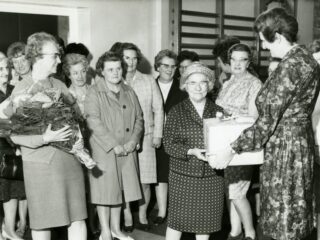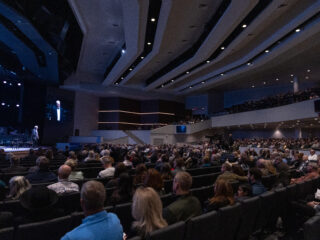Next Monday is Labor Day when we head to the nearest body of water to close out summer before the cool days of autumn usher us into winter. The long weekend is supposed to be a celebration of the men and women who make our nation work. Those nameless individuals who show up every day and do their jobs so we can do ours. The electricians and highway construction teams, the brick masons and carpenters and mechanics – and all the rest who, if they weren’t there, our world would grind to a halt.
For most of us, however, the holiday marks the official end of summer.
Yet, somewhere between the hotdogs and watermelon, we’ll ponder with each other about what life would be like if we didn’t have to work at all. What if we lived in a beautiful and peaceful paradise where we didn’t have to work to live? What if we could just sit around and enjoy life all day long?
If there are any Baptists at your Labor Day picnic, one of them will blame Adam and Eve for eating the apple and messing things up for everyone else!
None of that is true, however. Work was always part of the plan. There’s no evidence in the Scriptures that human beings were never supposed to work. The Bible story makes the opposite point. In Genesis 2, God places Adam in the garden to tend it and take care of it. I don’t know about you, but that sounds like work to me.
That story reminds me of the time my father told me he had a big job for me and put me “in charge” of all of the outside work at our house. While it sounded like a big job, it really meant I was responsible for mowing the grass and pulling weeds out of the flower bed. Like me, Adam may have been in charge of the garden, but it was just work.
What the Fall took away from us was meaningful work. All of us are caught in our own story of Sisyphus. We go to work, work hard all day, go home exhausted, and we can’t tell if we made any difference at all in the world. Then, we get up and go to work the next day and do it all over again. And for what? Whenever you see a ticker-tape parade, remember all that confetti is shredded reports someone spent a weekend writing.
All of us deal with this. It’s not the work we mind; it’s all that work demands from us. And, in the end, nothing we do will last. We build skyscrapers and, in a few years, someone tears them down. We write books and they are recycled to make more books. On and on the list goes. We work. We work hard, but all we create, build, and make ends up in the landfill at the end of the day.
It’s enough to make you think life doesn’t mean anything at all.
One way to understand the ministry of Jesus is that He returns to us what we lost in the Fall. In the Fall, we lost our connection to God. Jesus restores it. We lost our relationship with each other and Jesus restores it.
And Jesus restores meaning to work. Paul tells the early church that no matter what they did, as children of Jesus, they did everything as if they were doing it for Jesus Himself. It’s hard for us to fully grasp the radical nature of this teaching. What would you have done if you were a slave in Paul’s church and you heard that? What does it mean when you understand your work isn’t for the master, but for Jesus Himself? Not only was your work done as if you were doing it for Jesus, but your work was an actual act of worship. Our hours of labor were transformed into a sacrifice of service and praise.
I was taught this lesson as a child. I didn’t know it at the time, but I had seen this biblical teaching lived out. I grew up going to a little mill village church in Huntsville, Alabama. Mr. Greene was the part-time janitor at our church.
Our church was spotless. The linoleum floors were polished to a fine shine. Sometimes, they were so slick they were dangerous to walk on. The rooms were clean and the sanctuary was polished and well, the whole place was magnificent. I have never forgotten how clean my little church was.
Mr. Greene made sure it was always clean and it always stayed that way.
If you talked to Mr. Greene he would tell you Jesus was going to be a church on Sunday and he wanted the building to be ready for Jesus.
Think about it. Mr. Greene had taken the mundane chores of mopping floors, picking up trash, cleaning bathrooms, and dusting pews and made them into acts of worship. He wasn’t cleaning the church for a paycheck. He wasn’t cleaning the church for anyone’s approval.
Mr. Greene was cleaning the church for Jesus. Every Sunday I worshipped in that little church, I was sitting in the middle of Mr. Greene’s offering to Jesus.
So, enjoy your Labor Day holiday. Get together with friends and grill your favorite dogs and burgers.
Then, when you go back to work, remember the work you’re doing isn’t just for a paycheck. It’s for Jesus. Make sure you approach your work – whatever it is – as an offering to Jesus. Jesus has given meaning back to our work. Don’t let the world rob you of the joy of a good day’s work for Jesus.









